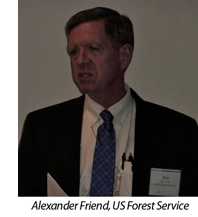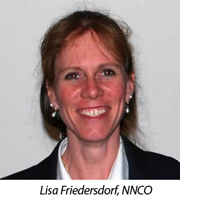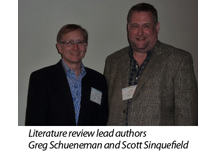APPTI Holds Nanocellulose Workshop on Advancing Commercialization
![]() Print this Article | Send to Colleague
Print this Article | Send to Colleague
Washington, DC, May 8, 2019—The Alliance for Pulp and Paper Technology and Innovation, in collaboration with the USDA Forest Service and the National Nanotechnology Coordinating Office (NNCO), held a workshop Advancing Commercialization of Nanocellulose – Critical Challenges, May 7-8 in Washington, DC,. 66 people from 44 companies, 5 government entities, and 14 universities participated in the event, conducted at the Agriculture Department’s Patriot’s Plaza III.
The two-day session was devoted to determining critical knowledge gaps and research needs which, if overcome, would have the greatest impact on accelerating widespread implementation and commercialization of nanocellulose materials and applications.
 U.S. Agriculture Under Secretary Jim Hubbard welcomed the group. He shared the Department’s "shared stewardship" approach to producing "outcomes, rather than outputs," in preventing devastating forest fires. "Some 80 million acres have been identified as at-risk," Hubbard said, "and we need innovative and emerging technology to expand our options. And we need it soon."
U.S. Agriculture Under Secretary Jim Hubbard welcomed the group. He shared the Department’s "shared stewardship" approach to producing "outcomes, rather than outputs," in preventing devastating forest fires. "Some 80 million acres have been identified as at-risk," Hubbard said, "and we need innovative and emerging technology to expand our options. And we need it soon." Alexander Friend, Deputy Chief of the U.S. Forest Service, also addressed the group. He cited the encouraging increase in nanocellulose production volume to 20,000 tons per year. He noted that the Forest Service’s investment contributions in developing US production capability represented his organization’s commitment to nanocellulose as related to its mission "to sustain the health, diversity, and productivity of the Nation’s forests and grasslands to meet the needs of present and future generations."
Alexander Friend, Deputy Chief of the U.S. Forest Service, also addressed the group. He cited the encouraging increase in nanocellulose production volume to 20,000 tons per year. He noted that the Forest Service’s investment contributions in developing US production capability represented his organization’s commitment to nanocellulose as related to its mission "to sustain the health, diversity, and productivity of the Nation’s forests and grasslands to meet the needs of present and future generations."  Lisa Friedersdorf, Director of the National Nanotechnology Coordination Office, added her welcome and noted that nanocellulose is called out as a material of focus in the Nanomanufacturing Signature Initiative. "There have been significant R&D advances over the past few years, and I look forward to the discussions about how to address remaining technical challenges to enable broad adoption and commercialization," Friedersdorf told the group.
Lisa Friedersdorf, Director of the National Nanotechnology Coordination Office, added her welcome and noted that nanocellulose is called out as a material of focus in the Nanomanufacturing Signature Initiative. "There have been significant R&D advances over the past few years, and I look forward to the discussions about how to address remaining technical challenges to enable broad adoption and commercialization," Friedersdorf told the group. Small groups identified and prioritized research needs to address remaining knowledge gaps in the areas of compatibilization of nanocellulose with other materials such as plastics, and of drying and dewatering. They then developed potential research approaches that might provide solutions to those needs. Going forward, APPTI and its nanocellulose team, along with its partners, will seek to execute the identified priority projects. Two opportunities for DoE funding were announced recently for which these projects could potentially apply (see DoE Innovative Manufacturing and DoE BETO Opportunity).
 Other highlights of the event included presentation of two literature reviews on compatibilization and on drying & dewatering by lead authors Greg Schueneman (U.S. Forest Service) and Scott Sinquefield (Renewable Bioproducts Institute, Georgia Tech), respectively. These reviews are being prepared for publication.
Other highlights of the event included presentation of two literature reviews on compatibilization and on drying & dewatering by lead authors Greg Schueneman (U.S. Forest Service) and Scott Sinquefield (Renewable Bioproducts Institute, Georgia Tech), respectively. These reviews are being prepared for publication. Jack Miller of Market-Intell discussed progress in global commercialization of nanocellulose as well as continuing commercial challenges. Workshop co-leads Kim Nelson of Gran Bio and Colleen Walker, University of Maine Product Development Center described end-user commercial needs. Michael Goergen, VP Innovation and director, P3 Nano Project, US Endowment for Forestry and Communities, recounted the challenges to be overcome in crossing the "valley of death" in which many startup companies founder.
 The event also showcased US capabilities in nanocellulose production and application. More than two dozen suppliers and users gave rapid-fire presentations of their capabilities and a number provided posters for review during an interactive networking luncheon.
The event also showcased US capabilities in nanocellulose production and application. More than two dozen suppliers and users gave rapid-fire presentations of their capabilities and a number provided posters for review during an interactive networking luncheon. For further information, watch the APPTI website (www.APPTI.org) or contact David Turpin, Executive Director (David.Turpin@APPTI.org).
The Alliance for Pulp and Paper Technology Innovation is an industry-led consortium that promotes development of advanced manufacturing technologies for the pulp and paper industry. For further information, please contact David Turpin (David.Turpin@appti.org) or visit the website (www.appti.org).


